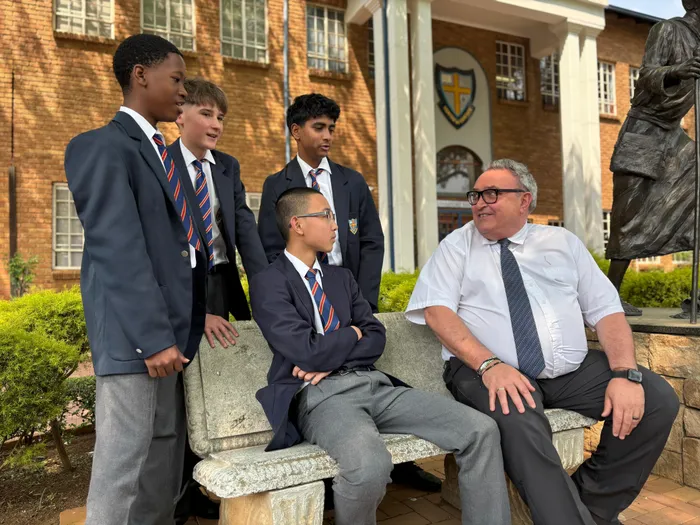Principals warn hostile parents are driving teachers from the profession

A growing number of school principals are raising concern about the rise of hostile, email-based communication from parents, a trend they say is pushing teachers out of the profession and damaging school-community relationships.
Image: File
A growing number of school principals are warning that hostile interactions with parents are making it harder to retain teachers and build long-term partnerships. The trend, they say, is hurting the school community and putting added strain on already overburdened educators.
Executive Head of St Benedict's, Andre Oosthuysen, says a small but increasingly vocal group of parents are engaging with schools through threats of legal action, aggressive emails, and public pressure, rather than constructive dialogue. He warns that this shift in parent behaviour is contributing to low teacher morale and may accelerate the profession’s ongoing attrition crisis.
Oosthuysen addresses what he describes as an alarming trend of hostile parenting that has accelerated in the post-pandemic years.
"Most of our parents are very supportive, but I am deeply troubled by the confrontational, threatening, and litigious approach that some parents are adopting when addressing concerns with schools," says Oosthuysen. "I question why educational institutions have become the 'soft target' for pent-up frustrations."
Frustrated with the status quo, Oosthuysen recently wrote to the school's extended community, expressing particular concern about parents who become "keyboard warriors," sending what he describes as "caustic correspondence threatening legal action, media exposure, or other measures designed to intimidate staff."

André Oosthuysen shares a light moment with learners, underscoring his belief in student-centred education and respectful collaboration with families.
Image: Supplied
Widespread problem across education sector
The hostile approach is not isolated to St Benedict's. Educational leaders at private and government schools across the country report similar experiences of verbal abuse, intimidation and bullying by parents.
Gill Jeffrey, executive and senior head of St Andrew's School for Girls in Johannesburg, confirms this troubling pattern. "While we have incredibly supportive parents overall, and I'm grateful for our positive interactions, there's a concerning trend among a small number of parents who now lead with aggressive threats – whether legal action, media attention, or political pressure - rather than engaging in the constructive dialogue that should come first when addressing any school-related issues."
Expanding on this, Jeffrey notes that the confrontational approach emerges across diverse concerns - whether related to academic results, disciplinary procedures, awards and colours for extracurricular activities, or misunderstandings involving students and teachers.
The South African Principals Association, which represents 1,500 government school principals, has also confirmed in a media statement by its president, Dr Mashudu Ramulumo, that this trend extends beyond private schools into the broader education system.
Partnership approach under threat
Oosthuysen emphasises that successful education depends on a strong partnership between parents and teachers, rather than an adversarial relationship. "Your school and its staff are not your opponents in your child's education. They are your partners," says Oosthuysen.
He acknowledges the pressures facing modern parents, including "increased workplace demands, economic challenges, overwhelming commitments, and unpredictable schedules," while noting that teachers face similar tremendous pressures. However, he argues that these personal burdens should be set aside in the interest of students.
Dr Deon Oerson, Head of School at Holy Rosary, explains the broader impact: "The erosion of relational wellness in schools is a result of high levels of parental mistrust, which often manifests as increased frustration and anger among parents. This disruption affects the social-emotional ecosystem where care should be at the heart of these relationships. The focus ends up being diverted from the pupil's wellbeing to time spent on managing parent expectations."
Oerson emphasises schools' responsibility to strengthen community relationships, encouraging parents to "see the school as a partner rather than just a service provider" and to "engage with the school through dialogue instead of confrontation, demonstrate respect, and acknowledge the school's efforts in resolving disagreements."
Long-term educational relationships at risk
Highlighting the long-term nature of educational partnerships - potentially lasting up to 14 years - Oosthuysen calls for restraint during conflicts and urges parents to address concerns "cordially, constructively, and hopefully."
"Young people are growing, developing human beings," says Oosthuysen. "Because they are still developing, there will be occasions when they falter or fail. There will be conflicts with peers that require staff intervention to ensure justice and to restore relationships."
Profession under pressure
Oosthuysen reflects on how the teaching profession's standing has declined, noting that "there was a time when teachers were among the most trusted and respected community members."
He warns that current trends compound an already critical situation: "We stand on the brink of an educational crisis. Let's not compound this challenge by driving more educators from the profession through disrespect and making them targets of frustration."
Call for constructive engagement
Rather than resorting to confrontational tactics, Oosthuysen emphasises that institutional doors remain open for constructive dialogue. He encourages parents to avoid taking situations at face value and to engage in direct, respectful communication with school staff.
"Let's celebrate the wonder of children growing up and counter the narrative of unkindness that society increasingly promotes," says Oosthuysen, reminding parents that "your child is our student too."